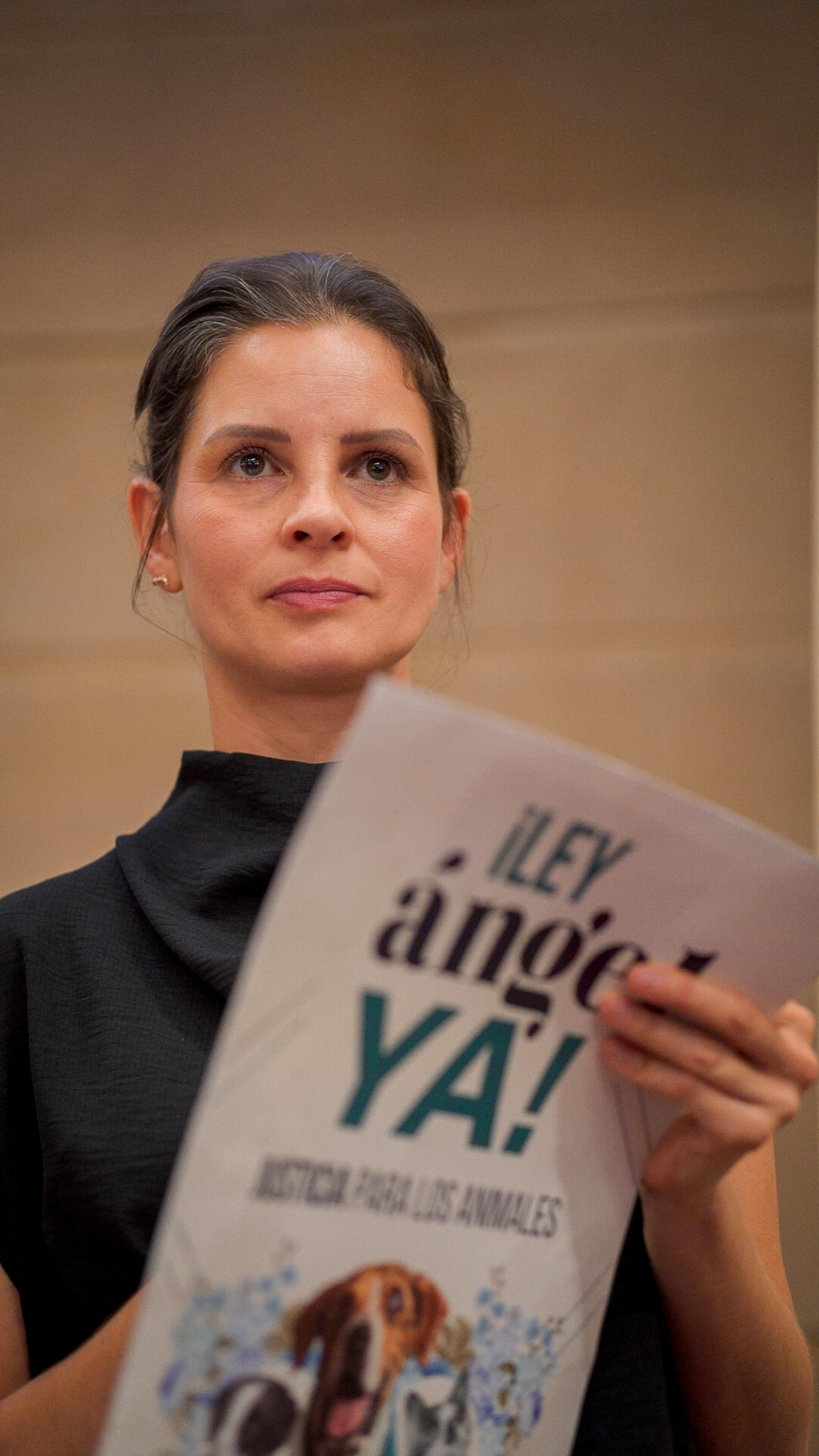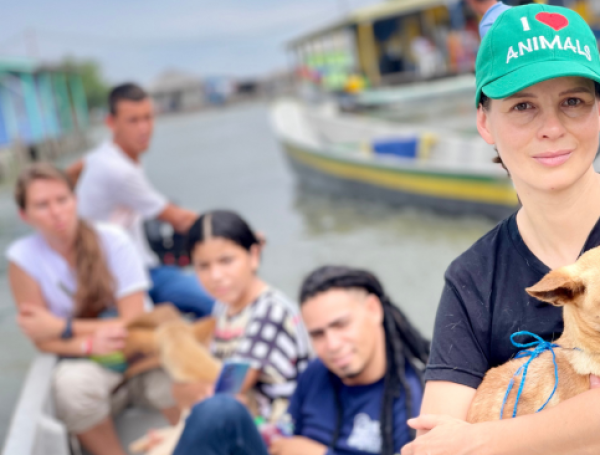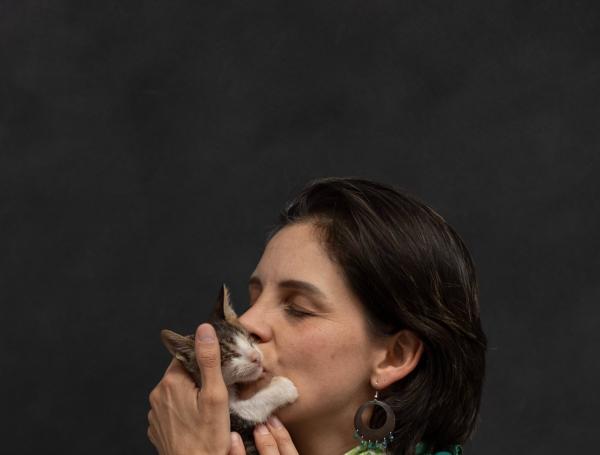'If you don't put pressure on organizations, they'll fall asleep': Andrea Padilla and her agenda for animals

In April, the President signed four key animal welfare laws promoted by Green Alliance Senator Andrea Padilla: a national state-run sterilization program for cats and dogs, criminal and administrative sanctions against abuse, regulation of pet daycare and services, and a plan to gradually replace dogs in private security services.
At the same time, Padilla is bringing to the debate proposals to expedite the transfer of seized wildlife, create regional animal care centers, and add animal protection to the school curriculum, while facing objections regarding the fiscal impact and pressure from security and veterinary services unions. In a conversation with EL TIEMPO, the senator discussed the advances in animal protection and the difficulties Congress has encountered in advancing them.

"The Ministry of ICT is developing technologies to replace canines in security." Photo: COURTESY OF ANDREA PADILLA PRESS
In a veritable legislative marathon, four key animal protection laws were passed on April 23: the Sterilize Save Law , which creates the National Cat and Dog Sterilization Policy with state funding; the Angel Law , which establishes criminal, administrative, and police sanctions against animal cruelty and incorporates pedagogical training for justice officials to deter these crimes and send a clear message of state rejection; the Lorenzo Law, which promotes the transition toward technologies that progressively replace dogs in security and private surveillance work, while implementing strict animal welfare regulations; and the Kiara Law, currently under conciliation, which for the first time regulates services for companion animals —daycares, hotels, grooming, pet shops, dog walkers, and veterinary services—in a sector that has generated three billion pesos in revenue over the last three years without any regulations.

"The roadmap should establish the entities that comprise Animal Welfare." Photo: COURTESY OF ANDREA PADILLA PRESS
The Lorenzo Law roadmap begins by recognizing that there are currently more than 6,000 dogs in private security , in two modalities: controlled defense (muzzle and deterrence, 35%) and scent detection (narcotics, weapons, currency). The Ministry of ICT is tasked with developing technologies to primarily replace controlled defense dogs , while the Ministry of the Environment, together with the Superintendency of Security and Surveillance, coordinates the National Animal Protection and Welfare System.
Among the milestones are reducing the maximum retirement age from eight to six years, raising the minimum age for entry into service from eight to twelve months, and requiring retirement plans that prevent euthanasia, promoting the adoption of healthy, trained dogs.
At the same time, welfare is being strengthened: kennels must have ventilation, natural light, adequate bedding, and more hours of recreation (currently only one), as well as 24-hour veterinary care. Furthermore, contractors (banks, universities, shopping centers) will assume joint responsibility for the protection and care of dogs during service, ensuring decent and permanent conditions for the animals.

Senator Andrea Padilla proposes creating a sterilization program for dogs and cats. Photo: COURTESY OF ANDREA PADILLA PRESS
Three main obstacles were identified in the processing of these laws:
1. Fiscal impact: All of these measures entail a cost for the state and compete for limited resources allocated to security, health, employment, and rights . The Sterilize Saves Law was particularly notable, as it secured national funding for the sterilization program in category 4, 5, and 6 municipalities (90% of the territory) and co-funded funding in category 2 and 3 municipalities, thus ensuring its budgetary viability.
2. Sectoral Lobbies: Business groups exerted pressure to soften or block requirements. In the Kiara Law, the pet daycare and hotel sector resisted the installation of video surveillance cameras, the formalization of contracts, and registration ; in the Lorenzo Law, it was private security companies that opposed it.

Senator Andrea Padilla has championed animal rights since she was 23. Photo: Courtesy of Andrea Padilla Press
Furthermore, the agenda in Congress was complicated: some congressmen refuse to assign more responsibilities to the mayors' offices ; others consider animal protection a minor issue and, therefore, avoid allocating time to it (due to lack of quorum, delays, or unfounded rejections). Even so, local pressure in their regions facilitated the passage of the Sterilize Wild Animals Act and the Angel Act.
- And what other wildlife and domestic animal bills do you have on your agenda for the remainder of this year and next? For the remainder of this year and the next, the agenda includes regulations already enacted into law and several initiatives under consideration that seek to strengthen the protection of wildlife and companion animals. A law facilitating the urgent transfer of wild animals that are victims of trafficking is already in force—allowing, for example, specimens seized in the south of the country to be quickly returned to their Caribbean region of origin—and, in its second reading, a bill is advancing that recognizes and supports the thousands of women who, without state aid, rescue and shelter dozens or even hundreds of cats and dogs in their homes or foundations.
In parallel, the so-called "Empathy Law" is in its third debate and will require public and private schools to include animal protection activities and content in their curricula to foster a culture of respect from childhood. Nearing approval in the final debate is the law on regional animal welfare centers , which will allow several municipalities to join forces to build facilities equipped and regulated by the Ministry of the Environment, intended to address emergencies and cases of unintentional abuse. Also being processed is the Zoopolis law, which will adjust horizontal property regulations to prevent conflicts over pet ownership in residential complexes ; the initiative on corralejas, which will regulate these bullfighting events by prohibiting sharp instruments, alcohol, and minors, and requiring insurance policies, licenses, and veterinary services; and, finally, the " Yoko Law," which seeks to declare Colombia free of great apes in captivity, prohibit the importation of exotic animals, and redirect efforts toward the protection of endemic fauna.

Andrea Padilla of the Green Alliance, for the defense of animals. Photo: PRIVATE ARCHIVE
Each law has a body responsible for its inspection, oversight, and control: the Lorenzo Law falls under the Superintendency of Surveillance and Private Security; the Ángel Law is overseen in the police sphere by police inspectors and mayors, and in the criminal sphere by the Prosecutor's Office and judges; and the Kiara Law is overseen by the Superintendency of Industry and Commerce , although its regulations are the responsibility of the Ministry of the Environment.

48,803 people voted for her for the Senate. Photo: Pablo Salgado
In the case of the Wild Sterilization Law, the Ministry of the Environment was supposed to issue the regulations and launch the fund -account to manage the resources starting January 12, but it hasn't done so, leading to a compliance action being filed to compel the ministry to act swiftly. This oversight work is part of building a truly state-run institution for the benefit of animals , which until now have remained virtually "orphaned" by effective oversight and funding mechanisms.

Trial: Former President Álvaro Uribe Vélez. Photo: EL TIEMPO
DANNA VALERIA FIGUEROA RUEDA
EL TIEMPO SCHOOL OF MULTIMEDIA JOURNALISM
eltiempo





